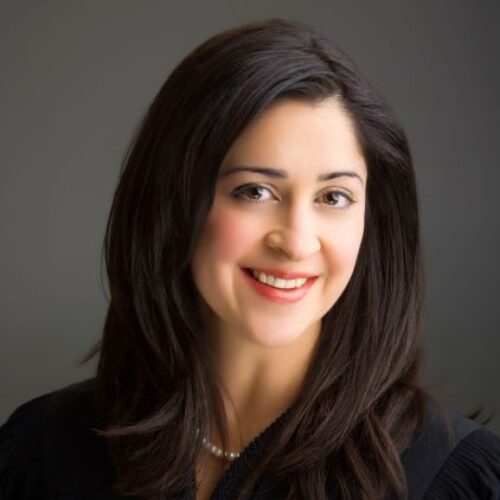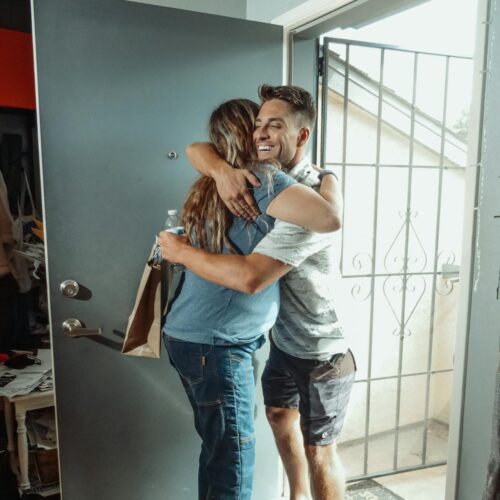Staff at the Council of State Governments (CSG) Criminal Justice / Mental Health Consensus Project recently spoke with Peter Brandt, Court Services Administrator for the Orleans Parish MHC, about the impact of Hurricane Katrina on the court. This feature summarizes that conversation, and describes how one MHC is responding to an extraordinary crisis.
Peter and his wife are safe, after making it through a harrowing evacuation process. They are staying with their son and daughter-in-law in Birmingham, Alabama. Consensus Project staff thank Peter for taking the time to speak with us in light of the enormous personal and professional challenges he faces as a result of the hurricane.
***
Just a few months ago, staff and case managers at the Orleans Parish Mental Health Court (MHC) were collecting outcome data and exploring ways to increase the court’s capacity beyond 100 participants. Today, using an office in Baton Rouge as their temporary headquarters, staff are scattered across the region searching for court participants displaced by Hurricane Katrina, wondering when they might return to their Tulane Avenue courthouse and offices.
Locating Participants and Staff
Peter reports that New Orleanians had from Friday to Saturday to prepare for the hurricane and evacuate. For court participants, criminal justice professionals, and mental health service providers, this meant that there was little time to think about anything other than getting out of the city. Peter says that “the staffs of all the organizations were evacuating…when it [the hurricane] came in, no one in their right mind believed they wouldn’t be back in less than a week…. There’s still no power, no water, no sewerage, no nothing.”
After cell phones started working again (two weeks later), and email was available, Peter got in touch with his entire staff and all the MHC case managers: “everyone wanted to go to work.” In order to “get everyone motivated and to stop feeling sorry for themselves,” Peter and his staff decided to “send everyone out to beat the bushes and look for people.”
Staff and case managers began searching – and continue to search – shelters in Louisiana, Texas, Virginia, Florida, Georgia, and anywhere else MHC participants may have sought refuge. A special email address was set up for case managers and staff to communicate with each other while they are on the road, and for MHC participants to communicate with the court. As staff and case managers travel the region, they are posting signs and speaking to large groups of evacuees. At shelters with computers and internet access, they are making announcements about the special email address.
Routine communication by cell phone was the norm among case managers and court participants at the Orleans Parish MHC before the hurricane. Each client has the cell phone number of his or her assigned case manager, and assuming that MHC participants had cell phones and were able to save them while evacuating the city, this line of communication was open when cell phone service was restored.
But Peter is candid: “Let’s face it, we don’t expect a lot of people to come back – not only our clients, we don’t expect a lot of people to come back period – lawyers, doctors, and everyone else.” Given the circumstances, many MHC participants remain unaccounted for.
Mental Health Services: Implications
When the hurricane warning and subsequent call for evacuation came into effect, there was no organized effort to enlist mental health service providers to stay behind to deliver services. Because service providers were evacuating with everyone else, Peter says that substance abuse and mental health services may not have initially been available at all of the shelters. Some providers were allowed into shelters, but many were turned away: “They said they wanted to talk to people, and were not allowed in, probably because the people running the shelters were being protective of the people inside and didn’t want any outside interference.” A recent policy enacted by the Red Cross encouraging substance abuse and mental health services has made things a bit easier for MHC staff, as they are now allowed greater access to shelters.
But many of the MHC participants require medication, which is one of the reasons why Peter’s staff began searching the shelters as soon as they could: “The case managers needed to tell the people running the shelters who they were, and that they had clients in need of medication and other assistance. But the simple fact is that our staff is all over the place – people went wherever they had a place to stay. It took a while for us to find out that everyone was safe and to put a plan in place to try to find our clients.”
Peter says that in the interim, the Red Cross and other agencies sent qualified people to triage and provide medical care. In some places there were even mobile pharmacies, so some people may have been able to receive medication and medical advice.
Criminal Justice Implications
By order of the Louisiana Supreme Court, all courts in Louisiana – state, municipal, and parish – were closed following the hurricane, and all deadlines for judicial filings and proceedings are void or suspended. Limited court operations resumed during the first week in October.
In addition to MHC staff and case managers combing the region for MHC participants, the Orleans Parish MHC is collaborating with the Louisiana Department of Corrections Division of Probation and Parole. Because specialty courts in Louisiana are mostly post-plea programs, MHC participants are also assigned to a probation agent as a condition of their probation. While the list of MHC participants is not necessarily separated from the probation agents’ entire case load, Peter is working to cross-check his lists with theirs.
Because the courts are closed, judges will determine probation or parole violations on an individual basis as people are found and deadlines pass. But Peter says that even if people are legitimately missing, after a certain period of time, “without a warrant, no one would even be looking for them. Whether they’re missing legitimately or not, we still have to find them.”
Anyone who has been arrested since the hurricane is being held at state prison facilities, where rotating judges are holding bond hearings.
Setting up in Baton Rouge
The Orleans Parish MHC decided to move to Baton Rouge, in a small office donated by Southern University. Peter says that there are many people trying to work in a relatively small space, and that work conditions are not ideal. Baton Rouge is now the largest city in Louisiana – the population has at least doubled since the hurricane, and commutes within the area that once took 15 minutes are now taking an hour and a half. Peter has “a computer, internet, fax machine, copier,” and is “probably getting more done here [in Alabama] than they are down in all that chaos.”
Next Steps
Shortly after the storm ended, a number of Peter’s staff salvaged the MHC’s computer servers, which contain participant records that include address information, case files, and other client information. Peter says that “they had to take a boat into what was basically a lake in order to reach the building.” Even though many of the addresses might now be nonexistent, the preservation of this information has significant legal and clinical implications: without client records, criminal justice and mental health services professionals would have had to compare word-of-mouth accounts and visual recognition of court participants at shelters and other refuges to the Department of Corrections Division of Probation and Parole master list. With their participant records, staff and case managers have more substantial and specific information to use on their search.
Fortunately, the MHC’s paper records also survived: they were stored on the eighth floor of the administrative building and the third floor of the courthouse.
“But since the city is still closed, no one can get to them.”
Even though Peter jokes about wishing that he had “packed all [his] clothes – instead of having three t-shirts and three pairs of shorts as [his] entire wardrobe,” he is optimistic, and says that the plan they developed after lines of communication re-opened is working and they are beginning to find people. “Word of mouth is very powerful in this community – when our case managers speak to a group at a shelter about a client who needs meds or is still missing, people take it seriously and pass the word along.”
Peter reports that Louisiana courts opened on October 5 with two makeshift sessions at a Department of Corrections facility 20 miles south of Baton Rouge. MHC personnel attended the sessions to learn who was going to appear before the court.
Federal Emergency Management Agency officials toured the Tulane Avenue courthouse during the first week of October, and reported that it will be at least 90 days until the building can be occupied. Peter’s administrative offices are located on the eighth floor of a 10-story building down the street from the courthouse, and staffers who have toured the building report that everything is fine: “It’s not livable yet because it’s so hot, but the space isn’t damaged.”
***
The Orleans Criminal District Court received funding from the Bureau of Justice Assistance to establish a MHC in October 2003. The court held its first docket in December of the same year, focusing on individuals with dual diagnoses. The formation of the MHC built on an existing collaborative infrastructure of judges, administrators, court intervention services, and community mental health services that was instrumental in the development of the Parish’s drug and domestic violence courts. The Louisiana Office of Mental Health, the Office of Addictive Disorders, the Office for Citizens with Developmental Disabilities, mental health advocacy groups, and other state agencies met to develop the policies and procedures involved with the operation of the MHC.
The Orleans Parish MHC is a post-plea court, and accepts participants with misdemeanor and nonviolent felony charges. The court provides mental health treatment, housing and employment assistance, and other social services.
The Consensus Project wishes Peter, his family, and everyone involved with the Orleans Parish Mental Health Court the best as they work through this difficult time.
The sharp rise in school shootings over the past 25 years has led school officials across the U.S.…
Read MoreA three-digit crisis line, 988, launched two years ago to supplement—not necessarily replace—911. Calling 988 simplifies access to…
Read MoreIt would hardly be controversial to expect an ambulance to arrive if someone called 911 for a physical…
Read More Taking the HEAT Out of Campus Crises: A Proactive Approach to College Safety
Taking the HEAT Out of Campus Crises: A Proactive Approach to College Safety
The sharp rise in school shootings over the past 25 years has…
Read More From 911 to 988: Salt Lake City’s Innovative Dispatch Diversion Program Gives More Crisis Options
From 911 to 988: Salt Lake City’s Innovative Dispatch Diversion Program Gives More Crisis Options
A three-digit crisis line, 988, launched two years ago to supplement—not necessarily…
Read More Matching Care to Need: 5 Facts on How to Improve Behavioral Health Crisis Response
Matching Care to Need: 5 Facts on How to Improve Behavioral Health Crisis Response
It would hardly be controversial to expect an ambulance to arrive if…
Read More Finding Solutions to Complex Criminal Justice Issues: Q&A with New CSG Justice Center Advisory Board Member Justice Briana Zamora
Finding Solutions to Complex Criminal Justice Issues: Q&A with New CSG Justice Center Advisory Board Member Justice Briana Zamora
The CSG Justice Center Advisory Board establishes the policy and project priorities…
Read More










